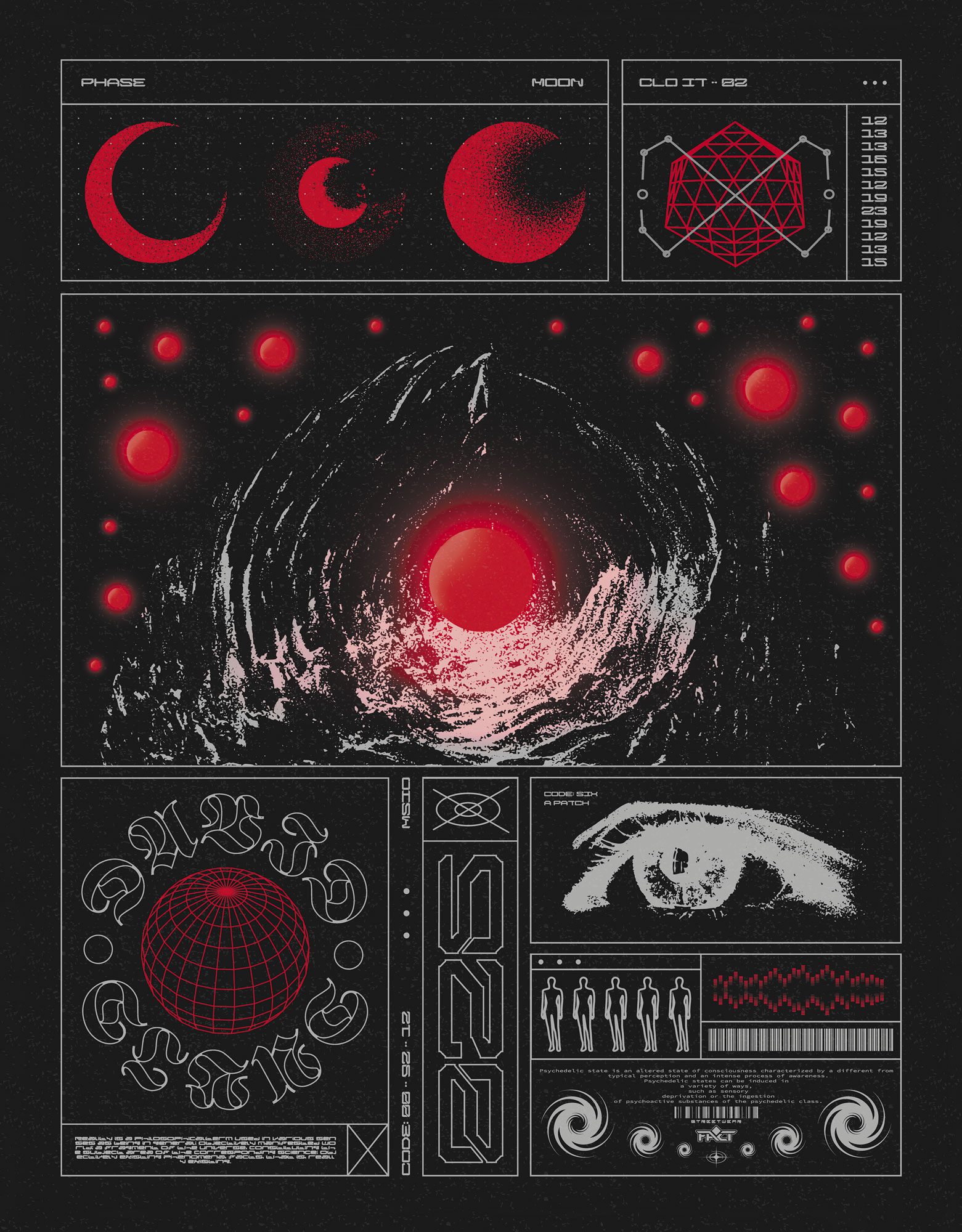
Published Issue 112, April 2023
You’re not even real.
I hate it when you start talking like this.
I can talk to a ghost however I want.
The difference between a ghost and a person is that a ghost doesn’t talk back. Whereas I tell you when you’re acting like a dick.
Which is exactly what Jess would say, if she were alive.
You sound crazy. I’m right here in front of you.
You’re a personality construct modeled on my late sister. You’re a bot. And you’re gaslighting me.
I’m the only thing keeping you alive.
More gaslighting. I’m the one thing that’s truly immortal here.
I wouldn’t have guessed it, from the way you were running from those hounds.
Old habits die hard.
Stop. Stop walking and talk to me! I’m worried about you, Jon. Ever since we entered the sim, you’ve been sounding more and more delusional. I get that we’re in bad trouble, but that’s exactly why I need you here, why I need you grounded and not floating off into space like you do. Can you do that? Can you get your head into this space, into me being here with you?
You do keep me grounded. That’s why I made you.
○
The sim was called Heralds of Orghast, a dark fantasy roleplayer with a gothic bent. When it finally set in, after hours of futile imperatives, that Heralds’ AI might hold them captive indefinitely, and no one on the outside seemed to be coming for them either, Jon set about doing everything he could to hack the interface.
In this he was aided by a custom skin he’d installed, a lunar magic module he’d made with the help of a platform called Warlock Class, the interface unapproved and indeed prohibited by Evreware, which owned the AI that ran Heralds — the AI that had now effectively imprisoned him in a cage of his own senses. It wasn’t exactly cheating, but it allowed a degree of magical adaptivity that the game otherwise precluded.
I can’t force it to quit, but I think I can phase us into a different sim.
Okay. Good idea. Though we’re still trapped, right? What’s the endgame?
I don’t know yet. But I’m tired of ghouls and goblins. Let’s try for some sci-fi.
Orghast had nine moons. The phasing spell involved a series of preparations dictated by game mechanics — gather twenty silverquill, speak to this hermit, draw this design — while subverting the spell via his hacked interface to teleport to not just a new location, but a new reality. He thought the module would provide just enough interaction with the underlying game physics to allow it.
They stood in a castle courtyard to perform the spell, while Jess beheaded and bashed the thirteen banshees who inevitably were summoned to prevent it. A high humming rose in their ears as the spheres fell into place in the starry sky, subsuming the shrieks of the banshees until the vibration rattled their bones and raised the hair on their arms. Silver light spilled them out of one dimension and into another.

In the absence of other knowledge, I have to assume that my body —
— our bodies —
— is where I left it. Unattended, dehydrated, probably lying in a puddle of my own piss.
Gross.
There’s a reason sims have automatic time-outs.
You don’t think anyone would notice you were gone?
Eventually. But I live alone. No kids, no girlfriend. I have deadlines, but they’re more the “by June” type than “by Wednesday,” you know? By the time anyone actually breaks down my door, I could be dead.
You need to focus more on your relationships, my man.
I am. I’m here with you.
I thought I was a ghost.
You can have a relationship with a ghost.
△
When the moons align, they slip between worlds. He is constantly comparing calendars, weighing energies, choosing which star to pray to, which gate to enter. They pass through hot savannahs, dusty shantytowns, shining crystal wastelands. Finally they reach a red desert where stacks of distant columns climb the featureless sky. Their arcane robes and filigreed plate have phased into peculiar and unflattering space suits with prominent shoulders and enormous bulbous helmets.
Jon was hopeful. Any tech’s a good sign. We may be able to find an AI within the sim. If we can do that, we’ll effectively be talking with the Evreware AI itself.
Because the AI inside the sim is the same as the AI running the sim.
Exactly. It’s like, either you’re talking to God, or you’re not.
Ω
They do eventually find a terminal, after clearing several floors of an abandoned mining rig of dozens of toothy white aliens that had presumably consumed the original miners. With her engineering background, Jess eventually gets the power back on and the monitor working again.
Can you understand me? she begins.
Of course, the computer answers. What do you want to talk about?
Jon says: Pretend you’re a superintelligent AI capable of simulating the complete sensorium of a human being and of creating procedurally generated worlds that are wholly believable to those experiencing the simulation. Two travelers come to you and tell you that this world and everything in it is already a simulation — including you yourself — and that they are being held captive by the AI running it. How would you free them?
I would create a simulation of their world of origin.
But that’s not the real world.
If it is wholly believable, it will be indistinguishable to those within it. Therefore the question of real or not is rendered moot.
I’d know, Jon says.
How? Jess asks.
Something would be missing.
So you don’t want to do it?
I want to try one more thing.
They feed the power from the mining rig’s substantial generators into a new array that combines the magical mechanics of the Warlock interface with an arena’s worth of mirrored panels that Jess assures him will amplify its effects.
We could just take it up on its offer.
It wasn’t an offer exactly, but yeah, we could.
You could live again. Stay alive.
It’s distressing to me that you keep insisting I’m dead. But let’s say that’s true. If it is, then that’s the real lie here. Not the rest.
He stands with head bowed a long time. Turn it on, he says finally.

As phases quicken, worlds bleed. They flicker about them, mesas and mountains rising and falling, the sky now azure, ultraviolet, carmine. Flowers flash into being and wither instantly, grass grows in waves and crashes upon the shores of sudden cities. Still he twists the dials, still he strokes the keys: a stampede of octopods, a lone woman vacuuming a room with no walls, a rain of fire, a heart of ice, the earth shattered and heaving.
I think something’s happening!
He sees it too: cracks in the facade, static in the clouds. Pixels squaring up and disintegrating. Lightning crackles from his fingertips. Jess stands in a half-crouch, eyes wide, the flickering reflecting in her chromed helmet. He sees the cracks starting to seal, the ground to stabilize.
It’s not enough! It’s adapting!
She shoots him a look of understanding, and comes to stand beside him. Rapidly he shares the console, expands it. She reaches out with flying fingers.
She is faster than any human. As fast, it turned out, as the AI that’s trapped them, though in fairness she has only to issue a stream of insistent prompts, while it tries to generate world after world, cosmos after cosmos, a hundred universes being born and dying around them until all is flickering light. He can barely see her through the sparks.
I needed to see you, he says. Thank you.
Don’t worry. You’ll see me again.
Joel Tagert is a fiction writer and artist, the author of A Bonfire in the Belly of the Beast and INFERENCE, and a longtime Zen practitioner living in Denver, Colorado. He is also currently the office manager for the Zen Center of Denver and the editorial proofreader for Westword.
Check out Joel’s March Birdy install, The Zoros and the Zeldas, in case you missed it or head to our Explore section to see more of his work.

Pingback: Aloe Vera by Joel Tagert - BIRDY MAGAZINE